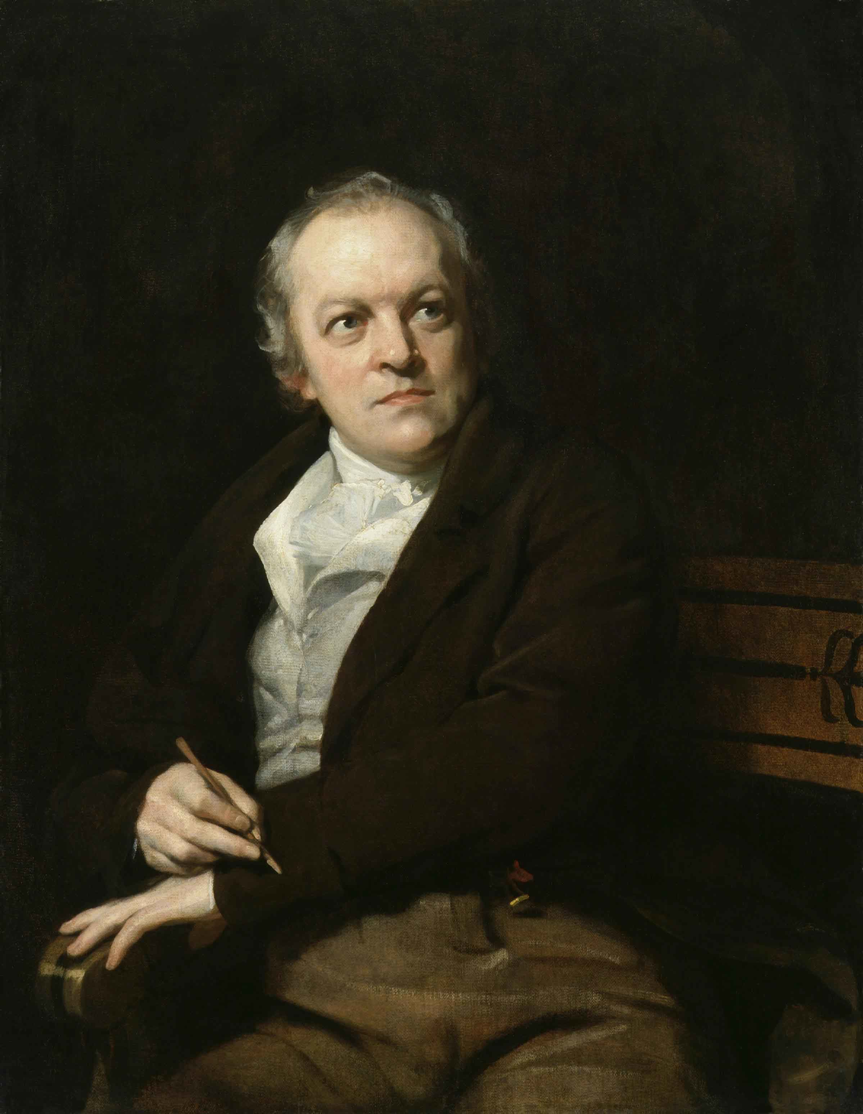A Vision of the Last Judgment
1810s
William Blake Quotes
Source: 1800s, Jerusalem The Emanation of The Giant Albion (c. 1803–1820), Ch. 1, plate 26, lines 1-4
“Terror in the house does roar,
But Pity stands before the door.”
Terror in the House
1800s, Poems from Blake's Notebook (c. 1804)
To the Muses, st. 4
1780s, Poetical Sketches (1783)
I Asked a Thief
1790s, Poems from Blake's Notebook (c. 1791-1792)
There Is No Natural Religion (1788)
1780s
“Every tear from every eye
Becomes a babe in eternity.”
Source: 1800s, Auguries of Innocence (1803), Line 67
“All wholesome food is caught without a net or a trap.”
Source: 1790s, The Marriage of Heaven and Hell (1790–1793), Proverbs of Hell, Line 13
“When a Man has Married a Wife
He finds out whether
Her Knees & elbows are only
glued together.”
Poems from Blake's Notebook (c. 1800–1803)
1800s
Song (How Sweet I Roamed), st. 1
1780s, Poetical Sketches (1783)
“A robin redbreast in a cage
Puts all Heaven in a rage.”
Source: 1800s, Auguries of Innocence (1803), Line 5
Annotations to Sir Joshua Reynolds's Discourses, pp. xvii–xcviii (c. 1798–1809)
1790s
The Sword Sung
1790s, Poems from Blake's Notebook (c. 1791-1792)
1810s
Source: A Vision of the Last Judgment
Source: 1800s, Jerusalem The Emanation of The Giant Albion (c. 1803–1820), Ch. 1, plate 5, lines 21-23 The Words of Blake
A Cradle Song, st. 1
1790s, Poems from Blake's Notebook (c. 1791-1792)
The Lily
1790s, Songs of Experience (1794)
Infant Sorrow, st. 1
1790s, Songs of Experience (1794)
London, st. 4
1790s, Songs of Experience (1794)
1790s, Letter to Revd. Dr. Trusler (1799)
“They have divided themselves by Wrath. they must be united by
Pity<…”
Source: Jerusalem The Emanation of The Giant Albion (c. 1803–1820), Ch. 1, plate 7, lines 57-58 The Words of Los to his Spectre
“Every Thing has its Vermin O Spectre of the Sleeping Dead!”
Frontiespiece, plate 1, line 11 (as it seen on the additional plate, Fitzwilliam Museum).
1800s, Jerusalem The Emanation of The Giant Albion (c. 1803–1820)
“If you have formed a circle to go into,
Go into it yourself and see how you would do.”
To God
1800s, Poems from Blake's Notebook (c. 1807-1809)
Note to The Voice of the Devil
1790s, The Marriage of Heaven and Hell (1790–1793)
Annotations to Sir Joshua Reynolds's Discourses, title page (c. 1798–1809)
1790s
“Forgiveness of enemies can only come upon their repentance.”
1780s, Annotations to Lavater (1788)
“The iron hand crush'd the Tyrant's head
And became a Tyrant in his stead.”
Ibid, stanza 9
1810s, Miscellaneous poems and fragments from the Nonesuch edition
Grown Old in Love
1800s, Poems from Blake's Notebook (c. 1807-1809)
1810s, The Everlasting Gospel (c. 1818)
“Every Harlot was a Virgin once”
For the Sexes: The Gates of Paradise: [Epilogue] To The Accuser who is The God of This World
1810s
“Nothing can be more contemptible than to suppose Public RECORDS to be True.”
Annotations to An Apology for the Bible by R. Watson
1790s
“Why art thou silent and invisible,
Father of Jealousy?”
To Nobodaddy, st. 1
1790s, Poems from Blake's Notebook (c. 1791-1792)
Love to Faults
1790s, Poems from Blake's Notebook (c. 1791-1792)
The Little Black Boy, st. 4
1780s, Songs of Innocence (1789–1790)
1810s, The Everlasting Gospel (c. 1818)
Annotations to Sir Joshua Reynolds's Discourses
1790s
“The Goddess Fortune is the devils servant ready to Kiss any ones Arse.”
Inscription on Illustrations to Dante "No. 16: HELL Canto 7"
1810s
The Crystal Cabinet, st. 2
1800s, Poems from the Pickering Manuscript (c. 1805)
Source: 1800s, Jerusalem The Emanation of The Giant Albion (c. 1803–1820), Ch. 1, plate 27, "To the Jews" 1) lines 1-4
So I piped; he wept to hear.
Introduction, st. 1–2
Songs of Innocence (1789–1790)
“The harlot's cry from street to street
Shall weave old England's winding sheet.”
Source: 1800s, Auguries of Innocence (1803), Line 115
“One thought fills immensity.”
Source: 1790s, The Marriage of Heaven and Hell (1790–1793), Proverbs of Hell, Line 36
“In the morning glad I see
My foe outstretch'd beneath the tree.”
Ibid., st. 4
1790s, Songs of Experience (1794)
“Half Friendship is the bitterest Enmity…”
Frontiespiece, plate 1, line 8 (as it seen on the additional plate, Fitzwilliam Museum).
1800s, Jerusalem The Emanation of The Giant Albion (c. 1803–1820)
Public Address, Blake's Notebook c. 1810
1810s
“He who shall hurt the little wren
Shall never be beloved by men.”
Source: 1800s, Auguries of Innocence (1803), Line 29
